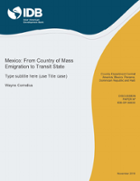Mexico: From Country of Mass Emigration to Transit State
Date
Nov 2018
This paper analyzes Mexico’s evolution as a historical country of emigration, exporting large numbers of workers to the United States for more than a century, to a transit state for Northern Triangle migrants seeking to enter the United States. The influx of transit migrants into Mexico, most headed for the United States, now exceeds the flow of undocumented Mexican nationals seeking entry into the United States. Return migration to traditional high-emigration communities in Mexico has dwindled to a trickle, as U.S. immigration control policies incentivized unauthorized migrants to settle permanently in that country and reunify their families on the U.S. side of the border. Mexico has never viewed itself as a country of immigration, but it has tolerated a steady flow of mostly temporary Guatemalan migrants to fill low-skilled agricultural and service jobs in the southern border region. Mexico’s growing role as a transit state has been highly contested by anti-immigration groups in the United States and by the U.S. government under President Donald Trump, who have been critical of lax enforcement of Mexico’s southern border, but also by human rights advocates concerned about violence and other abuses perpetrated against transit migrants by government agents, police, and criminal gangs. This paper documents how changes in national economies, demographic profiles, government policies, and rule-of-law problems have shaped all of these flows as well as ongoing debates over immigration policy. I conclude that Mexico’s role as a large-scale supplier of migrant labor to the United States has ended, regardless of future U.S. policy choices, due in part to depletion of the pool of potential migrants. Going forward, given Mexico’s own changing demographic profile, its challenge will be to assure a labor supply sufficient for robust domestic economic growth.
As Northern Triangle migrants seeking asylum in the United States have become bottled up within Mexico, due to new U.S. restrictions on allowable grounds for asylum claims, Mexico’s own asylum and deportation policies have gained heightened importance. Transit migrants who face life-threatening conditions in their home countries may now have no better option than staying put in Mexico for as long as possible.
As Northern Triangle migrants seeking asylum in the United States have become bottled up within Mexico, due to new U.S. restrictions on allowable grounds for asylum claims, Mexico’s own asylum and deportation policies have gained heightened importance. Transit migrants who face life-threatening conditions in their home countries may now have no better option than staying put in Mexico for as long as possible.




